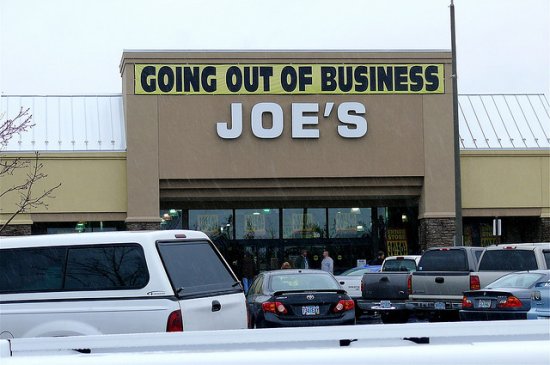If your employer files a Chapter 7 bankruptcy they are legally required to notify you. Then it would sell its kitchen equipment furniture and remaining.
 What Happens When A Corporation Files For Bankruptcy Allbusiness Com
What Happens When A Corporation Files For Bankruptcy Allbusiness Com
In addition if you are owed wages there is a chance you may not get them.

What happens when a company files for bankruptcy. It is the most common type of bankruptcy filing by businesses. Therefore the bankruptcy court will have jurisdiction over the right to decide any case involving an allegation that you owe money because you either failed to pay a debt or accidentally harmed someone in some way. A business organized as a sole proprietorship functions as an extension of the owner.
When a company files for Chapter 11 bankruptcy investors have basically two choices. So many beginner investors are unaware of what happens when a company files bankruptcy. Ride it out to the end hoping the company will revive or just bail out and take the loss.
The company must also file bankruptcy schedules. It needs the help of state and federal protections to keep it from doing so. This is the beginning of the end and there is little doubt that if your employer has taken this very serious step you will lose your job.
When a company files Chapter 7 it ceases doing business but a company that files. I hope this gave you some insight regarding investing in. Most small businesses that declare bankruptcy file Chapter 7 bankruptcy and close their doors immediately.
A companys stocks can still be traded even after the business has filed for Chapter 11 bankruptcy. What Happens When a Company Files Chapter 11 Bankruptcy. Many do but at the detriment of the shareholder who was holding the shares before the bankruptcy proceedings is over with.
For example a restaurant may declare bankruptcy and sell its catering van to pay off a few existing obligations. Once an individual or corporation files bankruptcy a provision called the automatic stay comes into play which allows the individual or corporation filing bankruptcy to avoid creditors demands while organizing for the coming proceedings. In most instances companies that file under Chapter 11 of the Bankruptcy Code are generally unable to meet the listing standards to continue to trade on Nasdaq or the New York Stock Exchange.
When a company files for Chapter 11 bankruptcy protection it means that the company is in danger of going out of business due to a significant amount of accrued debt. Bankruptcy affects your debts and assets. A Chapter 11 case starts when an attorney files a petition with the bankruptcy court.
While chapter 13 bankruptcy is also not ideal from a credit standpoint its setup is viewed more favorably because you are still paying off at least some of your debt and it will remain on your credit report for up to seven years. If a company files for bankruptcy it should work hard to pay off and reduce its debt load and operating expenses to stay in business. Many will buy these name brand companies thinking they are at deep discounts and will make a recovery.
Its always better to maintain control of. However even when a company is delisted from one of these major stock. After the assets are distributed and the trustee is paid a sole proprietor receives a discharge at the end of the case.
Chapter 11 bankruptcy is a debt reorganization in which the business expects to continue operating. This bankruptcy option requires asset liquidation selling anything of value to pay off their debt obligations. A business files for bankruptcy by filing a bankruptcy petition.
Generally companies that file under Chapter 11 do not meet the listing standards of the major stock exchanges such as Nasdaq or the New York Stock Exchange but their shares may continue to trade on either the OTCBB or the Pink Sheets. What Happens When a Business Files for Bankruptcy. Defining Chapter 11 Bankruptcy.
Bankruptcy is often confused with insolvency but the two words do not mean the same thing. A petition can be a voluntary one which the business owner files or it can be an involuntary one filed by creditors that meet certain requirements. In other words when a company declares Chapter 11 bankruptcy the debtor retains ownership and control of the company while it moves to negotiate and complete a payment plan.
What happens to a 401k plan depends on the type of bankruptcy protection an employer seeks -- Chapter 11 or Chapter 7. Employee Wages and Benefits. Workers whose employer files for Chapter 11 bankruptcy likely will see their plan.
Chapter 11 is a type of bankruptcy that allows the reorganization of business affairs. In Chapter 7 bankruptcy a trustee is appointed by the bankruptcy court to take possession of the assets of the business and distribute them among the creditors. A discharge means that the owner of the business is released from any obligation for the debts.
A credit card balance. A companys securities may continue to trade even after the company has filed for bankruptcy under Chapter 11. Enron filed for Chapter 11.
A few examples include cases involving. Because chapter 7 bankruptcy completely eliminates the debts you include when you file it can stay on your credit report for up to 10 years.
